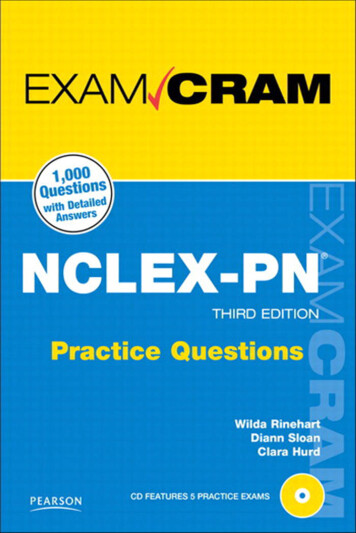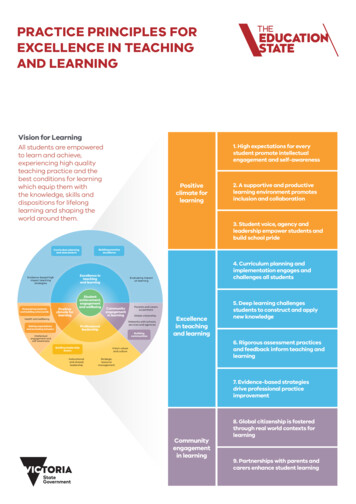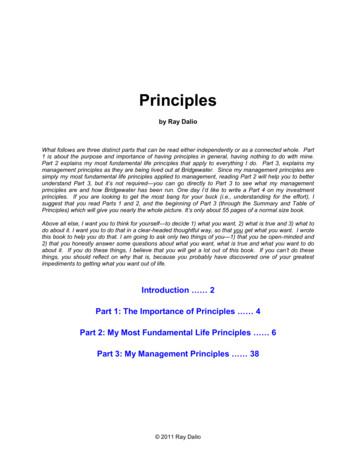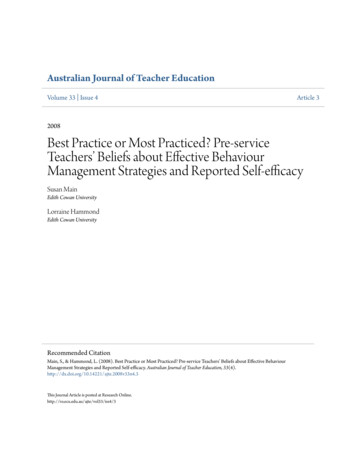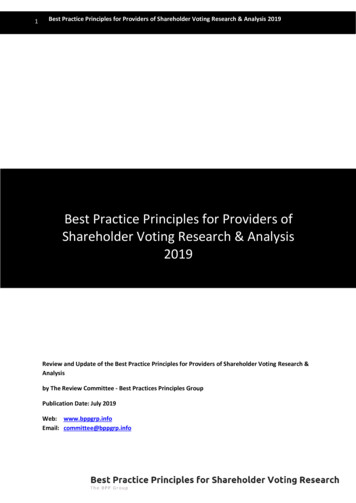
Transcription
1Best Practice Principles for Providers of Shareholder Voting Research & Analysis 2019Best Practice Principles for Providers ofShareholder Voting Research & Analysis2019Review and Update of the Best Practice Principles for Providers of Shareholder Voting Research &Analysisby The Review Committee - Best Practices Principles GroupPublication Date: July 2019Web: www.bppgrp.infoEmail: committee@bppgrp.info
2Best Practice Principles for Providers of Shareholder Voting Research & Analysis 2019Table of ContentsPart One: Preamble .4Executive Summary .4Purpose.5Scope .5Contents of the Principles .6Definitions . 7Part Two: Applying the Best Practice Principles .9Apply and Explain .9Meaningful, relevant and detailed explanations .9Public Statement of Compliance .9Annual Update of the Statement of Compliance .9Material Non-Compliance . 9Part Three: The Best Practice Principles. 10Principle One: Service Quality . 10Principle Two: Conflicts-of-Interest Avoidance or Management . 11Principle Three: Communications Policy . 11Part Four: Governance of the Best Practice Principles . 12Structure . 13Membership . 13Nomination and Election . 13Reporting . 14Individual Signatory Compliance .14Monitoring. 14Signatory Criteria . 14Funding Structure . 14Appendix 1: Guidance on Applying the Principles . 16Appendix 2: BPP Signatories. 25Appendix 3: BPP Review Committee & Chair . 26Appendix 4: BPP Review Stakeholder Advisory Panel . 29Appendix 5: BPP Review Process. 31Appendix 6: BPP Oversight Committee .33
3Best Practice Principles for Providers of Shareholder Voting Research & Analysis 2019Acronyms and Definitions UsedBPP or The Principles refer to the Best Practice Principles for Providers of Shareholder VotingResearch and AnalysisBPPG refers to Best Practice Principles Group for Providers of Shareholder Voting Research andAnalysisBPP Oversight Committee refers to the governing body providing an annual independent review ofthe monitoring of the Best Practice Principles and the public reporting of each BPP SignatoryBPP Review Committee comprises the current BPPG members and Independent Review ChairBPP Signatories refers to all ratified signatories to the Best Practice PrinciplesESMA refers to the European Securities and Markets AuthorityGeneral Meeting refers to a meeting of a company's shareholders whether an Annual GeneralMeeting or Extraordinary General MeetingSRD II refers to the EU Shareholder Rights Directive II
Best Practice Principles for Providers of Shareholder Voting Research & Analysis 20194Part One: PreambleExecutive SummaryThese reviewed Best Practice Principles for Providers of Shareholder Voting Research & Analysis2019 (“Principles”) are the result of a thorough review process by the Best Practice Principles Group(“BPPG”) which refers to the latest updated stewardship codes globally1, the requirements of therevised EU Shareholder Rights Directive II (“SRD II”) and the ESMA 2015 Follow-Up Report on theDevelopment of the Best Practice Principles for Providers of Shareholder Voting Research and Analysis(“2015 ESMA Follow-Up Report”). It also refers to the input of investors, issuers and otherstakeholders received through a public consultation by the BPPG (completed in December 2017) anda review by the BPP Review Committee chaired by an independent review chair. These 2019Principles replace the original 2014 Principles.2019 Best Practice Principles Key Updates New Governance Oversight ArrangementsNew Reporting ArrangementsNew Monitoring ArrangementsUpdated Principles and GuidanceIn an increasingly complicated investment landscape, investors often choose to engage the servicesof data and analytics providers and other research providers to support their investment-relatedactivities. Providers of shareholder voting research and analysis provide important research andanalysis services to support investors in exercising one of their most important stewardshipresponsibilities and shareholder rights, that of casting informed votes at a company's annual generalor special meeting.The BPPG aims to educate global stakeholders about the role and key features of shareholder votingresearch and analysis service providers within the investment process; to advocate for the interestsof research service users and providers worldwide; and to encourage high industry standards of goodpractice, independence and transparency. In working with regulators, market participants and otherrepresentative bodies, the BPPG promotes sound practices in the shareholder voting research andanalysis industry that serve the needs of investors and, as such, strengthen the capital markets.The standards contained in the Principles not only ensure the availability of high-quality research andthe integrity of the business practices of BPPG members, but also to foster improvement, innovationand vigorous competition within the industry. BPPG members are committed to abiding by theantitrust and competition laws of all jurisdictions in which they operate. Nothing in these Principles isa substitute for adherence to relevant laws and market regulations.1See Appendix 5 page 30
Best Practice Principles for Providers of Shareholder Voting Research & Analysis 20195PurposeThe purpose of the Principles is to complement applicable legislation, regulation and other soft-lawinstruments and contribute to a greater understanding among investors, issuers and otherstakeholders about: the nature and character of shareholder voting research and analysis services;the standards of conduct that are required to underpin those services;how signatories to the Principles (“BPP Signatories”) interact with other market participants.ScopeThe Principles have been developed to be applied by providers of shareholder voting research andanalysis globally, even though the Principles were originally conceived as a soft-regulatorymechanism in the European Union (“EU”). Of note, although the new SRD II Article 1 refers to a short,relatively narrow definition of “proxy advisor”, the scope of the Principles is broader than thisdefinition. The 2015 ESMA Follow-Up Report highlighted that the comply-or-explain principle onwhich the Principles are based, allows for tailored implementation based on each BPP Signatory’scharacteristics. Therefore, entities that fall partially under the definition of the Principles should beable to – and are encouraged to – apply the Principles to the appropriate extent. As a corollary,however, and to promote application of the Principles as a global code of conduct, the BPPG will putin place a process for ratifying BPP Signatories that is governed by the Principles’ OversightCommittee body (see “Part Four: Governance of the Best Practice Principles”).The Principles apply to providers of shareholder voting research and analysis. BPP Signatories provideservices associated with the provision of shareholder voting research and analysis. In addition topromoting the integrity and efficiency of processes and controls related to the provision of suchservices, the Principles are intended to foster greater understanding of the role of service providersin facilitating the voting decisions made by institutional investors (i.e., asset owners and fundmanagers). New BPP Signatories beyond members of the BPPG are encouraged to adopt thePrinciples.The Principles are based on the notion that investors have a number of important ownership rights,one of which is the right to vote at general meetings. Voting is a key right of investors, whoseeffective discharge may also be a fiduciary responsibility. As with many other parts of the investmentprocess, investors need access to information and administration tools that support them in thedischarge of their responsibilities. BPP Signatories provide a range of professional services designedto assist investors in the discharge of their rights and responsibilities. In the spirit of the apply-orexplain framework2, the Principles set forth here are designed to facilitate transparency and assistBPP Signatories’ conduct in discharging their responsibilities toward their clients.2See Part Two: Applying the Best Practice Principles page 9
Best Practice Principles for Providers of Shareholder Voting Research & Analysis 20196These Principles have been developed with the following considerations in mind: The services are an efficient way of managing the logistical complexities associated withanalysing and interpreting company disclosures, as well as ensuring and managing theoperational aspects of shareholder voting; Clients may use one or more services that support and complement their own in-houseresearch and voting activities; Clients may, themselves, be subject to a variety of rules and regulations in relation to assetownership and oversight; BPP Signatories’ underlying clients are responsible for their own compliance procedures; BPP Signatories operate within the framework provided by applicable law, including thosegoverning company law, contract law and client confidentiality and data protection, as wellas securities laws associated with market abuse and insider trading; Nothing in these Principles is a substitute for adherence to relevant laws and marketregulations.Irrespective of the type of services used to support ownership and voting activities, these Principlesare based on the understanding that the ultimate responsibility to monitor investments and makevoting decisions lies with investors. The use of third-party services – such as those provided by BPPSignatories that deliver high-quality support, thought-leadership, expertise and insight – does notshift this responsibility or relieve investors from any fiduciary duty owed to their clients. Stakeholderswishing to understand how an institutional investor discharges its stewardship or ownershipresponsibilities should consult relevant disclosures of the investor to understand its approach. Thisincludes how the investor takes national market, legal, regulatory and company-specific conditionsinto account and how this relates to global standards of corporate governance and investorstewardship frameworks.Contents of the PrinciplesThe Principles are not a rigid set of prescriptive rules; rather they consist of a set of Principles andaccompanying Guidance. The Principles describe a code of conduct for providers of shareholdervoting research and analysis. Not all BPP Signatories offer the same services in the same way. Theway in which the Principles are applied should be the central question for each Signatory as itdetermines how to apply these Principles. The Guidance recommends how the Principles are to beapplied (see Appendix 1). The Principles may be regarded as reflecting widely-held and acceptedgeneral views on how providers of shareholder voting research and analysis contribute to the rolesand responsibilities of investors and issuers in fostering effective stewardship and robust corporategovernance and ensuring efficient markets.BPP Signatories may depart from these Principles and Guidance, provided they give reasons for doingso. The conditions for departures are explained below in the section titled “Compliance with thePrinciples”33See Part Two: Applying the Best Practice Principles page 9
Best Practice Principles for Providers of Shareholder Voting Research & Analysis 20197DefinitionsAs highlighted in the earlier Scope section (see page 5), SRD II Article 1 applies a relatively narrowdefinition of the type of service provider. According to SRD II, the term “proxy advisor” refers to alegal person that analyses, on a professional and commercial basis, the corporate disclosure and,where relevant, other information of listed companies with a view to informing investors’ votingdecisions by providing research, advice or voting recommendations that relate to the exercise ofvoting rights.’Although the Principles include this definition, they also include broader definitions in line with the2015 ESMA Follow-Up Report4.ServicesTo better understand the relevance and application of the Principles, it is important to understandthe different types of services BPP Signatories provide. The key objective of BPP Signatories is tosupport institutional investors in the exercise of their ownership rights and responsibilities throughthe provision of value-added services. Services may be provided on a commercial, not-for-profit ormembership basis.Shareholder Voting Research & AnalysisBPP Signatories analyze the corporate disclosures of listed companies with a view to informinginvestor voting decisions. Services include the provision of research, advice or votingrecommendations that relate specifically to the exercise of voting rights. The services may exhibitone or more of the following characteristics: Data and analysisCompany-specific research, advice or opinionsESG Assessment or Ratings5Policy guidanceVoting recommendationsAlerts, bulletins and newslettersDepending on the services subscribed to, the services may yield different results for different clients.This is because governance and ownership policies and preferences will vary from organisation toorganization.Note: Unless otherwise stated or disclosed, BPP Signatories do not act on behalf of any particularshareholder or group of shareholders that is trying to influence how other shareholders vote.Similarly, BPP Signatories do not act on behalf of an issuer that is trying to secure votes from itsshareholders.Vote agency and/or engagement and governance overlay servicesIn addition to shareholder voting research and analysis services, BPP Signatories may also provideother services, such as vote agency and/or engagement and governance overlay services.4ESMA 2015 Follow-Up Report on the Development of the Best Practice Principles for Providers of ShareholderVoting Research and Analysis Page 115Per para (20) Regulation (EC) No 1060/2009 “ESG Ratings” do not constitute Credit Ratings
8Best Practice Principles for Providers of Shareholder Voting Research & Analysis 2019 Vote Agency: A voting agent provides shareholder vote execution services, whereby thevoting agent is responsible for some or all of the logistical and operational activitiesassociated with transmitting instructions from the institutional investor to the companymeeting, as well as record-keeping and reporting activities. Votes may be transmitted tothe meeting directly (including personal attendance) or through a chain of operationalintermediaries, depending on regulatory or market specificities in each relevantjurisdiction.Engagement & Governance Overlay Services: Engagement services are defined asundertaking contact and engagement with issuers on behalf of an investor or group ofinvestors with a view to asking the company in question to amend aspects of itsgovernance.Overlay services are defined as the provision of fully outsourced governance engagement and votingservices to institutional investors. Vote agency, engagement and governance overlay serviceproviders may provide shareholder voting research, recommendations and analysis as part of theirservice. Where this is the case, the provisions of these Principles apply to the shareholder votingresearch and analysis services they offer, either on a standalone basis or in conjunction with otherservices. The particularities of vote agency and engagement services are not addressed by thesePrinciples.Note: Unless otherwise stated, disclosed or addressed by these Principles, BPP Signatories act underthe direct instruction of their investor clients and do not cast votes without their authority.
9Best Practice Principles for Providers of Shareholder Voting Research & Analysis 2019Part Two:Applying the Best Practice PrinciplesApply and explainThe new Principles operate on an “apply and explain” basis, in line with SRD II. This enables eachSignatory to explain how the Principles relate to their specific circumstances and business model.Meaningful, relevant and detailed explanationsBPP Signatories that choose not to apply one of the Principles, or choose not to follow the Guidance,should deliver meaningful, relevant and detailed explanations that enable the reader to understandtheir approach. The explanations should be substantiated and adapted to the Signatory’s particularsituation and should convincingly indicate why a specific aspect justifies a departure from a Principleor the Guidance. The explanations provided should state what alternative provisions have beenmade, if applicable. If a Signatory intends, at a later stage, to apply a Principle from which it hasprovisionally deviated, it should state when this temporary situation will come to an end.Public Statement of ComplianceEach BPP Signatory should publish its annual Statement of Compliance with the Principles(“Statement of Compliance”) on its own website, and via a link to the BPPG’s independent website. Ifthey so choose, BPP Signatories may also wish to issue their Statement of Compliance via otherpublicly-accessible sources. Furthermore, ESMA displays on its website a list of entities that haveadvised ESMA that they are BPP Signatories together with a link to the independent BPPG website.The Public Statement of Compliance should: Describe in a meaningful way how the BPP Signatory applies the Principles and relatedGuidance; Disclose any specific information set out in the supporting Guidance; Where any of the Principles have not been applied or relevant information has not beendisclosed, provide a reasoned explanation as to why.Annual Update of the Statement of ComplianceIn line with the requirements of the SRD II, each BPP Signatory is responsible for updating itsStatement of Compliance on an annual basis and for ensuring that the statement is publicly availableon the Signatory’s corporate website. Access to a BPP Signatory’s Statement of Compliance mustremain available, free of charge, for at least three years from its publication date.Material Non-complianceThe complaints procedure is detailed on the BPPG website here: ack/ and all complaints will be considered as part of the BPP OversightCommittee’s annual review process (see page 14).
Best Practice Principles for Providers of Shareholder Voting Research & Analysis 201910Part Three: The Best Practice PrinciplesThe Principles for Providers of Shareholder Voting Research & Analysis were updated in 2019. ThePrinciples are supported by Guidance that also was updated in 2019. Detailed in Appendix 1, theGuidance explains the background, relevance and application of the Principles. The apply-andexplain framework applies to both the Principles and the Guidance. All relevant policies should beclearly disclosed on a Signatory’s company website and updated annually. The updated Principlesand Guidance are the result of a thorough review process by the BPPG, which refers to the latestupdated stewardship codes globally6, the requirements of the revised SRD II and the ESMA 2015Follow-Up Report. The updated Principles and Guidance also reflect the input of investors, issuersand other stakeholders received through a Public Consultation (completed in December 2017); theresults of a review by the BPPG Review Committee, a process overseen by an independent reviewchair; and discussions and feedback from a global, diverse Stakeholder Advisory Panel.These Principles are based on the understanding that the ultimate responsibility to monitorinvestments and make voting decisions lies with investors. Use of third-party services such as thoseprovided by BPP Signatories which deliver high-quality voting research and analysis, does not shiftthis responsibility or relieve investors from any fiduciary duty owed to their clients. Stakeholderswishing to understand how an institutional investor discharges its stewardship or ownershipresponsibilities should consult relevant disclosures of the investor to understand its approach. Thisincludes how the investor views global standards of corporate governance and investor stewardshipframeworks and the extent to which national market, legal, regulatory and company-specificconditions are considered.Principle One: Service QualityBPP Signatories provide services that are delivered in accordance with agreed-upon investor clientspecifications. BPP Signatories should have and publicly disclose their research methodology and,if applicable, “house” voting policies. BPP Signatories’ disclosure will include: 6the essential features of the methodologies and models they apply;the main information sources they use;procedures put in place to ensure the quality of the research, advice and voting;experience and qualifications of the staff involved;whether and, if so, how, BPP Signatories take national market, legal, regulatory andcompany-specific conditions into account; how this relates to global standards ofcorporate governance and investor stewardship frameworks;the essential features of any house voting policies BPP Signatories apply for each market(client-specific custom policies will not be disclosed);how BPP Signatories alert clients to any material factual errors or revisions to research,analysis or voting recommendations after research publication.See Appendix 5, page 30
11Best Practice Principles for Providers of Shareholder Voting Research & Analysis 2019Principle Two: Conflicts-of-Interest Avoidance or ManagementBPP Signatories’ primary mission is to serve investors. BPP Signatories should have and publiclydisclose a conflicts-of-interest policy that details their procedures for avoiding or addressingpotential or actual conflicts of interest that may arise in connection with the provision of services.In addition to disclosing their general policy, BPP Signatories should also have a process in place toidentify and disclose without delay to their clients, on a case-by-case basis, actual or potentialconflicts of interest or business relationships that may influence the preparation of their research,advice and voting recommendations and the actions they have undertaken to eliminate, mitigate andmanage actual or potential conflicts of interest.Principle Three: Communications PolicyBPP Signatories’ primary mission is to serve investors. BPP Signatories should provide high-qualityresearch that enables investor clients to review the research and/or analysis sufficiently in advanceof the vote deadline ahead of a general meeting. This primary accountability to investors shouldremain the key priority for BPP Signatories when applying Principle Three.With regard to the delivery of Services, BPP Signatories should explain their approach tocommunication with issuers, shareholder proponents, other stakeholders, media and the public.BPP Signatories should disclose a policy (or policies) for dialogue with issuers, shareholderproponents and other stakeholders. BPP Signatories should inform clients about the nature of anydialogue with relevant parties in their research reports, which may also include informing clients ofthe outcome of that dialogue.
Best Practice Principles for Providers of Shareholder Voting Research & Analysis 201912Part Four:Governance of the Best Practice PrinciplesBPP Oversight CommitteeThe BPPG has established a BPP Oversight Committee to provide an annual independent review ofthe monitoring of the Best Practice Principles and the public reporting of each BPP Signatory.The BPP Oversight Committee’s governance aims to provide:1. Confidence in the Principles that underpin the services provided by BPP Signatories.2. Guidance and advice to the BPPG with respect to the operation and development of thePrinciples.BPP Signatories are expected to co-operate with the BPP Oversight Committee, consistent withapplicable contractual and legal requirements.Scope and Responsibilities1. Independent, annual reviews of each BPP Signatory’s Public Statement of Compliance, inorder to identify matters considered to require further BPP Signatory action or clarification.2. Ratification of applications by new BPP Signatories that have been approved by BPPGmembers (see the BPPG Membership and Governance Guidelines 2016 on the BPPG website,which may be updated in due course by the BPP Oversight Committee) and sanction ofSignatories that are non-compliant, including the ultimate sanction of the Committee endingBPP Signatory status and BPPG membership7.3. Oversight of the complaints-management procedure8 of the BPPG, monitoring of outcomesand responses to the BPPG.4. Management of an annual open forum for investors, companies and other interestedstakeholders for education, questions and feedback on the Principles.5. Review and administration of suggested minor updates to the Principles outside of theperiodic major reviews and updates.6. Monitoring of progress and impact of the Principles.7. Development and publication of an annual report summarizing the activities and findings ofthe BPP Oversight Committee. The annual report will be published on the website of the BestPractice Principles Group https://bppgrp.info.7The ratification and sanctioning terms of reference are to be developed in further detail by the BPP OversightCommittee8The complaints procedure is detailed on the BPPG website here: ack/ and all complaints will be considered as part of the BPP OversightCommittee’s annual review process
13Best Practice Principles for Providers of Shareholder Voting Research & Analysis 2019StructureRoleIndependent ionDescriptionChair to be completely independent of BPPGmembers and BPP Signatories11 members in total:6 institutional investor/representative bodies3 companies/representative bodies2 independent (e.g. academic)Offer observer status to appropriateinterested regulatorsSupport to be provided by the BPPG MembersTime Period2-year term2- or 1-year terms as below4 x 2-year term; 2 x 1-year term1 x 2-year term; 2 x 1-year term1 x 2-year term; 1 x 1-year termMeeting by meeting basisOngoingMembershipThe BPP Oversight Committee shall be comprised of an Independent Chair and Committee Memberswith a diverse mix of skills, backgrounds, knowledge, experience and geographic locations.The Principles have been developed to promote understanding of and confidence in the servicesprovided by the BPP Signatories. These services play an important role in supporting investors’exercise of their stewardship rights and responsibilities. The representation of investors is thereforeof primary importance and, for this reason, six members will be drawn from investor/investorrepresentative bodies. The representativeness of investor members is also important thereforeoverall membership should reflect different investment styles (e.g. active vs. passive) and geographicregions (at least on
Best Practice Principles for Providers of Shareholder Voting Research & Analysis 2019 4 Part One: Preamble Executive Summary These reviewed Best Practice Principles for Providers of Shareholder Voting Research & Analysis 2019 (Principles _) are the result of a thorough review process by the est Practice Principles Group ( PPG _) which refers to the latest updated stewardship codes globally1 .





